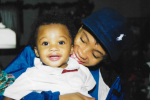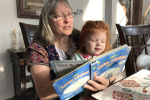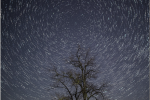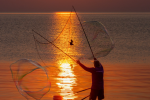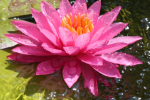One of the interesting things about modern life is that almost nobody you talk to is where they started out thinking they would be at this point in their lives. And even then, almost nobody really sought to be where they now are. And yet, almost all of them are satisfied to be there. And best of all, almost all of them are happy.
Correction: Almost all of them found happiness on the other side of unhappiness, the side of it they definitely would have avoided if only they could have. Life is like that. It is the discovery of light in what seems to be the darkest of places, a coming to find the stars behind the clouds, the astonishing revelation of fullness where only emptiness seemed to be.
I met a woman recently, for instance, whose business failed. Went absolute bust. She was devastated and desperate. So she went back to school in slim hope of getting into some kind of skills training that would be recession-proof. Instead, she wound up as a corporate trainer. Her face glows when she tells the story of the failure that turned out to be her life’s desire.
Then, I had supper with a woman who had been a successful teacher in a country in Central America. Her husband, a labor leader, found himself declared an enemy of the government, hunted down, in danger. If he wanted to save his life, he had to leave the country. At the same time, it was hard for her to even think of leaving—very hard. She had no desire whatsoever to come here, to lose her parents, her sisters, her professional position, her home, her friends, her country—her language even. But she was married. She had children. For her it was not a choice. Today she is a citizen with a stable job, her own home, new friends, a new future, a radiant smile, a strong character, and a look in her eye that tells not only of where she’s been, but the joy of where she is.
I was once in a small group discussion on “Contemplation and the Modern World.” The question was: “What is the place of contemplation, if any, in contemporary society?” Most of the answers were rooted in classic and traditional understandings of the contemplative approach to life. But one man took all the classic answers and made them real.
“Two years ago,” he said, “my wife and I lost everything: our home, our investments, our property, our belongings. I never could have imagined that it would happen. I thought we were set for life. Then, the market crashed.”
Pause. Silence. Deep breaths from everyone in the group.
“Then,” he went on, “I discovered that only the journey to the God-self within is really life-giving. I’m sorry it had to happen that way, but I’m better off now than I was then. I just didn’t know it.”
In every case, it was what people found on the other side of darkness that was the light for which they were seeking.
The death of one thing, it seems, is often a necessary part of the process of discovering where life really is for us. After we think that getting what we want is what it’s all about, we discover that real life for us was, all this time, waiting for us somewhere else.
TUESDAY, JULY 1: When life turns dark for us, we forget that day always follows the blackest part of night. In fact, sometimes it is only the darkness that propels us toward new light.
WEDNESDAY, JULY 2: We hear over and over again that every time one door closes, another one opens. The problem is that theydon’t tell us that to find it, we can’t sit down and quit. We have to walk through the first door to get to the other.
THURSDAY, JULY 3: It’s not so much the future that is the problem; it is anxiety about the future that blocks us from dealing wellwith the present.
FRIDAY, JULY 4: It’s important to be able to recognize endings; otherwise, we will die in a past that was never meant to be our future.
SATURDAY, JULY 5: Being willing to begin again is one of life’s greatest talents. There is nothing to be gained by refusing to move in another direction when this road clearly ends—except pain, of course.
SUNDAY, JULY 6: When we learn to think big, to plan big, to reach for life beyond the present, we are most fully alive.
MONDAY, JULY 7: “Hitch your wagon to a star,” Ralph Waldo Emerson said. It’s a ride worth taking even if we never get where we thought we wanted to go.
TUESDAY, JULY 8: So often, we begin to see newly only when we can’t see at all. It is only then that we are finally forced to create the ideas within us that we might otherwise never have bothered to consider at all.
WEDNESDAY, JULY 9: When we don’t know what to do next, that is exactly when we are best equipped to do something exciting. Then, the walls in our minds come down and anything is possible.
THURSDAY, JULY 10: Regret does not happen because we did what we did. Regret comes because we did not do what we could have. And that awareness comes always with a twitch. It is an invitation without a response.
FRIDAY, JULY 11: There are two approaches to life: one is attempting to fulfill all our desires; the other is learning to be desireless. Only one of these is certain.
SATURDAY, JULY 12: Life is not one choice. It is a series of many choices. It is not one stage or phase or decision. It is many of them. And it is out of all those things that we become the fullness of ourselves.
SUNDAY, JULY 13: When we cut off our choices, we cut off another whole part of ourselves. “Where people fail,” Anaïs Nin writes, “is that they elect a state and remain in it. This is a kind of death.”
MONDAY, JULY 14: Doubt is the counterpoint of discovery. It is doubt of the enduring value of the present that leads us to the brink of discovery.
TUESDAY, JULY 15: When questions are forbidden, doubt begins to erode our faith. “Doubt,” Benjamin Jowett wrote, “comes in at the window when inquiry is denied at the door.” Anything that cannot bear the light of a new question is to be considered very,very carefully.
WEDNESDAY, JULY 16: God is the mystery no answers dare to determine. God is the mystery that makes all of life and our place in it, all our blunderings and all our changes, life-giving.
THURSDAY, JULY 17: Doubt is the guardian of tomorrow. “Just think of the tragedy of teaching children not to doubt,” the great lawyer Clarence Darrow said.
FRIDAY, JULY 18 : Without doubt, there would have been no end to the institution of slavery, no movement for women’s suffrage, no change to any of the oppressive institutions that for so long governed our world.
SATURDAY, JULY 19: Does religion ever doubt? Of course it does. That’s what theology is for. Otherwise, limbo would still be in the catechism of the church. Or as the philosopher Bertrand Russell put it: “In all affairs it’s a healthy thing now and then to hang a question mark on the things you have long taken for granted.”
SUNDAY, JULY 20: We spend more time fearing the unknown than we do imagining new opportunities. It is fear that holds us back, fear that entraps us, not possibilities.
MONDAY, JULY 21: The discovery of all that life can hold for us requires that we leave one part of it to get to another. It’s the leaving that is so hard—even when what we’re leaving behind has clearly had its day.
TUESDAY, JULY 22: The dark places of life are the in-between moments that prepare us to move on when otherwise we would not be inclined to go.
WEDNESDAY, JULY 23: Rulers of all stripes dispense certainties—theirs—with great abandon. They do whatever it takes—define cultural dogmas, assert organizational doctrines, impose decrees, and use power, force and penal systems—to suppress the ideas of anyone who dares to question them. Ideas, after all, are dangerous things. Ideas have brought down as many myths and mysteries as they have toppled kingdoms.
THURSDAY, JULY 24: There are always some in every population who know that life is not meant to be about certainty. Life, they realize, is about possibility. They see certitude as a direction but not an end.
FRIDAY, JULY 25: What we accept without question, we will live without morality.
SATURDAY, JULY 26: It is doubt, not certitude, that enables us to believe, because it requires us to think deeply about an entire subject.
SUNDAY, JULY 27: Only when we look beyond absolutes to understand every level of life can we possibly live life to the fullest, with the deepest kind of insight, with the greatest degree of compassion for others.
MONDAY, JULY 28: Certainty is comfortable but always unlikely and forever disrupted. As life changes so must our explanation and response to it.
TUESDAY, JULY 29: Darkness deserves gratitude. It is the alleluia point at which we learn to understand that all growth does not take place in the sunlight.
WEDNESDAY, JULY 30: Never fear periods of darkness in life. They are the atrium to new phases of life, the threshold to new experience, the invitation to move on from where you are to where there is more for you to learn.
THURSDAY, JULY 31: The spiritual life begins when we discover that we can only become spiritual adults when we go beyond the answers, beyond the fear of uncertainty, to that great encompassing mystery of life that is God.
LET’S SHARE OUR THOUGHTS
The following discussion questions, Scripture echo, journal prompts, and prayer are meant to help you reflect more deeply on The Monastic Way. Choose at least two suggestions and respond to them. You may do it as a personal practice or gather a group interested in sharing the spiritual journey.
DISCUSSION QUESTIONS
1. When in your life have you gone through times of uncertainty, doubt, and darkness? Did you find light on the other side of it?
2. Which daily quote in The Monastic Way is most meaningful to you? Why? Do you agree with it? Disagree? Did it inspire you? Challenge you? Raise questions for you?
3. After reading The Monastic Way, write one question that you would like to ask the author about this month’s topic.
4. Joan Chittister uses other literature to reinforce and expand her writing. Find another quote, poem, story, song, art piece, novel that echoes the theme of this month’s Monastic Way.
5. On July 25, Sister Joan writes, “What we accept without question we will live without morality.” Does this ring true for you? Is there anything you think should not be questioned? Have you ever questioned something only to commit to it more deeply?
JOURNAL PROMPTS
Prompt 1: Here are a few statements from this month’s Monastic Way. Choose one that is most helpful to you and journal with it.
• We spend more time fearing the unknown than we do imagining new opportunities.
• Darkness deserves gratitude. It is the alleluia point at which we learn to understand that all growth does not take place in the sunlight.
• God is the mystery no answers dare to determine.
Prompt 2: Spend a few minutes with this photograph and journal about its relationship to this month’s Monastic Way. You can do that with prose or a poem or a song or....
SCRIPTURE ECHO
Where can I go from your spirit,
Or where can I flee from your presence?
If I climb the heavens, you are there.
If I lie in the grave, you are there.
If I take the wings of the dawn
And dwell at the sea’s furthest end,
Even there you will lead me
And hold me fast.
If I ask darkness to hide me,
This darkness is not dark for you,
And night is as bright as day.
© Benedictine Sisters of Erie
PRAYER
Prayer for a Questioning Heart
May your journey through the questions of life
bring you to a new moment of awareness.
May it be an enlightening one.
May you find embedded in the wisdom of the past,
like all the students of life before you,
the answers you yourself are seeking now.
May they waken that in you which is deeper than fact,
truer than fiction, full of faith.
May you come to know that in every human event
is a particle of the Divine
to which we turn for meaning here,
to which we tend for fullness of life hereafter.
© Joan Chittister

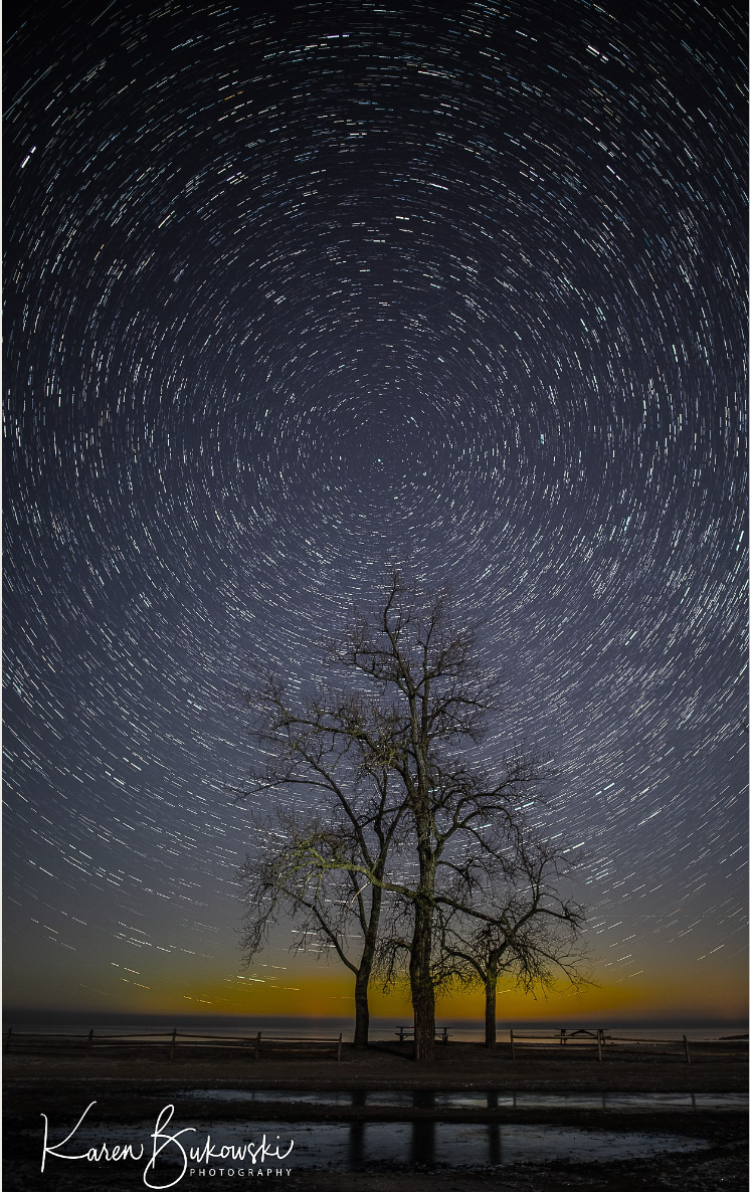 Artwork: by Karen Bukowski
Artwork: by Karen Bukowski
